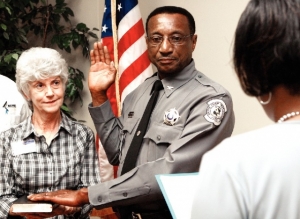WCC moves to full-time police force, picks chief
By Nick Hiltunen
Published in News on May 23, 2010 1:50 AM

News-Argus/MICHAEL BETTS
Wayne Community College Chief Security Officer Willie Brinson is sworn in to have police powers by Leasa Holmes, with college President Dr. Kay Albertson holding a Bible. The added powers will give Brinson the same arresting powers as a local officer.
A "real police chief" has been sworn in at Wayne Community College, representing another step in the school's transition from organized security guards to a true police force.
W.L. "Willie" Brinson took the oath as chief of the Wayne Community College Police Department.
Ms. Deans said the college began its transformation to a fully-accredited law enforcement agency Jan. 6. She said she had been working to accredit the police agency for years.
"I felt like we needed that extra enforcement avenue, to protect our faculty, students and visitors," Ms. Deans said. "With sworn officers on our campus, police will be able to use force, and arrest if necessary."
The switch to an actual police agency began with an application to the N.C. Department of Justice's Criminal Justice Training and Standards Commission. The application included background checks not just for Brinson, but also the college's board of trustees and its college president, Ms. Deans said.
Brinson, who has 30 years of law enforcement experience, said he is excited about the new job.
Although there are similarities between policing a city and a campus, Brinson said the college atmosphere is typically a much calmer one.
"You're dealing mostly with law-abiding students," he said.
Having two full-time sworn officers and six part-time officers also will ease the burden securing the college has previously put on the Goldsboro Police Department. In the past, city police officers had to be called to incidents that happened on campus.
Ms. Deans said the switch to a fully-accredited law enforcement agency comes at no additional cost to the college.
"There is no more of a cost with a fully-accredited law enforcement agency than there is having a fully-staffed security agency," Ms. Deans said. "The budget pretty much is going to stay the same."
Brinson said the accredited status will give campus police officers access to crime databases both local and statewide.
"We will have access to find out who's wanted by police, and who's not wanted," the chief said.
Ms. Deans said a college police agency will provide extra protection if a someone with a weapon were ever to enter the campus. In such a situation, the school would enter a "full lockdown" mode, she said, and move students and faculty to a centralized location while campus police sought the suspect.
Officers will be able to carry guns, which would also help in such a situation, Ms. Deans said.
In day-to-day activity, however, campus officers would have a less dangerous focus.
"We've had some minor issues with things walking off. We're wanting to protect our equipment a little bit more," Ms. Deans said.
